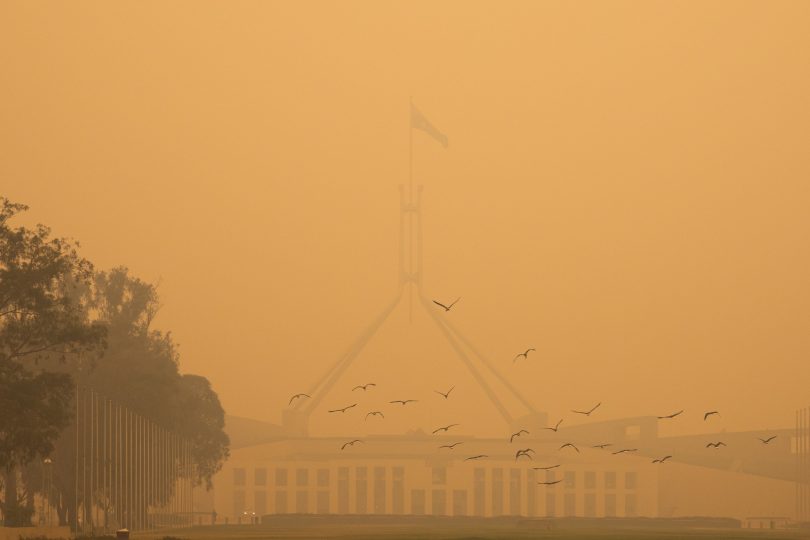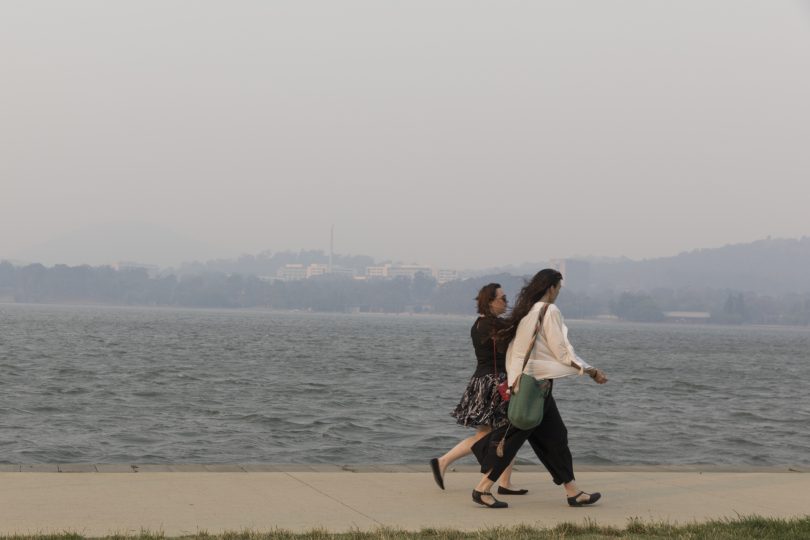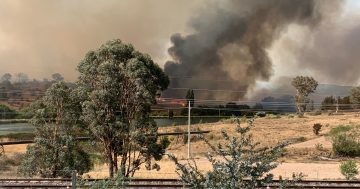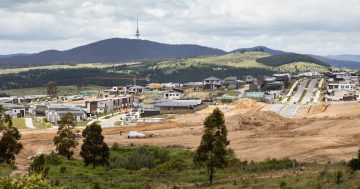
Smoke blankets Parliament House at the beginning of January. Photo: Region Media.
With no immediate relief from the smoke haze that continues to blanket Canberra, the ACT Work Safety commissioner and UnionsACT secretary have warned that employers have a duty of care to ensure all workers are provided with a safe and smokefree workplace.
UnionsACT secretary Alex White said the organisation has been contacted by many people who reported they were required to work for extended periods while exposed to smoke levels many times above hazardous levels during the Christmas and New Year period.
This includes a range of industries covering retail, cafes and restaurants, aged care and construction.
Mr White said the air quality index in Canberra has been above 200 (hazardous) on 29 days since 1 December. He said employers who forced workers to work in the toxic bushfire smoke during the December-January period should be prosecuted.
“It is essential that WorkSafe acts to protect the health of working people and takes action against employers who knowingly exposed their employees to serious health risks.
“The bushfire smoke that has covered Canberra since last year is toxic. There is no safe level of exposure. Case law demonstrates that employers cannot claim ‘ignorance’ of the risks of the smoke as a defence.”
ACT Work Safety Commissioner Greg Jones this week said employers have a legal responsibility under the Work Health and Safety Act 2011 to ensure all workers are provided with a safe workplace.
“This includes all aspects of their work tasks and their environment, including any work conducted at alternate locations such as a home. Employers must undertake their due diligence, as required under the Act, by ensuring all risks are assessed and appropriate mitigation strategies put in place,” Mr Jones said.
“Due to the heavy smoke conditions impacting the ACT, WorkSafe is encouraging employers to look at mitigation strategies to eliminate or minimise the impact of the current heat and smoke conditions, particularly by eliminating strenuous or outdoor work where possible, including postponing or rescheduling work.”
Access Canberra has even warned people booked in for a driving assessment on smoky days that their appointments may be cancelled “to support the health and safety of both our clients and staff who may be undertaking a driving assessment”, an Access Canberra spokesperson said.
Mr Jones said mitigation measures should include rotating workers to limit prolonged exposure to smoke and providing P2 masks for those engaged prolonged outdoor activity or workers sensitive to smoke.
Employees are being encouraged to speak up if they are feeling the effects of smoke and to take regular breaks.

Smoke haze over Canberra. Photo: Michelle Kroll, Region Media.
For event planners wishing to host activities outside, given the current weather and smoke in the air, only essential activity should be arranged.
“We suggest that you consider ways to best manage and reduce any risks to attendees and staff. Event organisers are encouraged to view the ACT Emergency Services Agency website and the ACT Health website for advice in relation to air quality and smoky air, and review their safety, emergency response and WHS plans,” Mr Jones said.
Mr Jones added that, at this stage, no asbestos testing of air quality is considered necessary.
“With consideration to the relatively small number of buildings and structures lost and the very large number of other contaminants from bushland fire, the risk of increased levels of airborne asbestos fibres is extremely low and considered to be no greater than normal atmospheric levels,” he said.
These views are backed by an expert in global environmental health at the Australian National University, Professor Sotiris Vardoulakis, who said breathing in fine particles from bushfires has serious health effects.
Recently published research from Professor Vardoulakis found that short and long-term exposure to particulate matter – the hazardous particles within smoke – is associated with increased illness and death rates.
“Some people like the smell of wood-burning in their fireplace because they think it is good and natural. But it is bad for your health. Smoke coming from burning is harmful no matter where it comes from,” Professor Vardoulakis said.





















